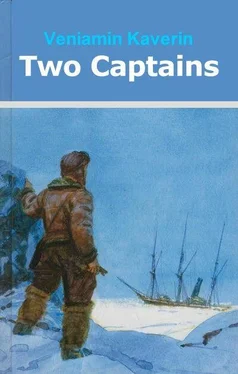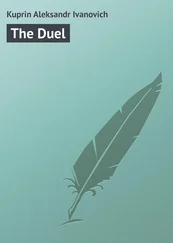"I've been over to Grandma's, and you're still asleep," she rattled off. "Grandma's kitten has got lost. Where's Ivan Ivanovich?"
His mattress lay on the floor and you could still see the depressions where his head, shoulders and legs had been. But Ivan Ivanovich himself was not there. He used to put his knapsack under his head, but that too was missing. He used to cover himself with his sheepskin coat, but that too was gone.
"Ivan Ivanovich!"
We ran up into the attic, but there was nobody there.
"I swear to God he was asleep when I went to Grandma's. I remember looking at him and thinking: while he's asleep I'll run over to Grandma's. Oh, Sanya, look!"
On the table lay a little black tube with two round knobs at the ends, one of them flat and slightly bigger, the other small and deeper. We remembered that Ivan Ivanovich had taken this from his knapsack together with other instruments when he had looked into my ear.
Where had he gone? Ivan Ivanovich!
He had vanished, gone without saying a word to anyone!
Chapter Six
FATHER'S DEATH. I REFUSE TO SPEAК
All through the winter I practised speaking. First thing in the morning, barely awake, I uttered loudly six words which Ivan Ivanovich had instructed me to say every day: "hen", "saddle", "box", "snow", "drink" and "Abraham". How difficult it was! And how well, how differently my sister pronounced these words.
But I kept at it. I repeated them a thousand times a day, like an incantation that was to help me somehow. I even dreamed them. I dreamed of some mysterious Abraham putting a hen in a box or going out of the house in a hat, carrying a saddle on his shoulder.
My tongue would not obey me, my lips barely stirred. Many a time I felt like hitting Sanya, who could not help laughing at me. In the night I woke up, heavy with misery, feeling that II would never learn to speak and would always remain a freak, as my Mother had once called me. The next moment I was trying to pronounce that word too-"freak". I remember succeeding at last and falling asleep happy.
The day when, on waking up, I did not utter my six magic words, was one of the saddest in my life.
Petrovna woke us early that day, which was odd in itself, because it was we who usually went to her in the mornings to light the fire and put on the kettle. She came in, tapping her stick and stopped in front of the icon. She stood there for some time, muttering and crossing herself. Then she called to my sister and bade her light the lamp.
Years later, a grown-up man, I saw a picture of Baba-Yaga in a fairy-tale book. She was the image of Petrovna-the same bent, bearded figure leaning on a gnarled stick. But Petrovna was a kind Baba-Yaga, and that day… that day she sat down on a bench with a heavy sigh, and I even thought I saw tears rolling down her beard. "Get down, Sanya!" she said. "Come to me." I went up to her.
"You're a big boy now, Sanya," she went on, patting me on the head. "Yesterday a letter came from your mother saying that Ivan is ill."
She wept.
"He was taken very bad in prison. His head and legs have swollen up. She writes that she doesn't know whether he's still alive or not." My sister started crying.
"Ah well, it's God's will," Petrovna said. "God's will," she repeated with angry vehemence and looked up at the icon again.
She had only told us that Father had fallen ill, but that evening, in church, I realised that he was dead. Grandma had taken us to church to "pray for his health", as she said.
Oddly enough, after three months spent in the village, I hardly knew anybody except two or three boys with whom I went: skiing. I never went anywhere because I was ashamed of my handicap. And now, in church, I saw our whole village-a crowd of women and old men, poorly dressed, silent and as cheerless as we were. They stood in darkness; candles were burning only in the front, where the priest was reading prayers in a long-drawn-out manner. Many people were sighing and crossing themselves.
They were doing this because he was dead, and my sister and I were standing in the darkness of the church because he had died. And we were standing and "praying for his health" because he was dead.
Petrovna took my sister back with her, and I went home and sat on for a long time without lighting the lamp. The cockroaches, which Grandma had brought to us on purpose-for good luck-rustled on the cold stove. I ate potatoes and wept.
Dead, and I would never see him again! There they were, carrying him out of the Chambers, out of that room where Mother and I had handed in the petition… I stopped eating and clenched my teeth at the memory of that cold voice and the hand with the long dry fingers slowly dangling a pair of spectacles. You wait! I'll pay you back for this! Some day you'll be bowing to me, and I'll tell you: "My dear man, the court will go into this…" There they were, bearing the coffin down the corridor, while messengers hurried past with papers and nobody sees or cares to see him being carried out. Only Aunt Dasha comes forward to meet it in a black shawl, like a nun. She comes forward, weeping. Then we stop, someone stands at the door, the coffin sways in the men's hands and is lowered to the floor. Mother bows, and looking up, I can see her lips quivering.
I came to myself at the sound of my own voice. I must have been feverish, because I was uttering some incoherent nonsense, cursing myself and also, for some reason, my mother, and carrying on a conversation with Ivan Ivanovich, although I knew perfectly well that he had left long ago and that even his tracks in the field had kept for only two days until the snow had covered them up.
But I had spoken-spoken loudly and clearly! I could now speak and explain what had happened that night on the pontoon bridge;
I could show that knife was mine, that I had lost it when I bent over the murdered man. Too late! A whole lifetime too late; he was now beyond any help of mine.
I lay in the dark with my head in my hands. It was cold indoors, my feet were chilled, but I stayed like that till morning. I decided that I would not speak any more. Why should I? All the same he was dead and I would never see him again. It did not matter any more.
Chapter Seven
MOTHER
I have no very clear memory of the February Revolution, and until our return to town I did not understand that word. But I do remember associating all the strange excitement and puzzling talk around me with my nocturnal visitor who had taught me to speak.
Spring passed before I was aware of it. But summer began on the day when the Neptune, hooting and backing in a menacing way, moored alongside the wharf where Mother and us two had been waiting for it since the morning. We were going back to town. Mother was taking us home. She looked thinner and younger, and was wearing a new coat and a new brightly coloured shawl.
I had often thought, during the winter, of how astonished she would be to hear me speak. But she only embraced me and laughed. She had changed a lot during the winter. All the time she was thinking about something-I could tell that by the quick changes of expression in her face: at one moment she looked anxious and was silent, the next she smiled, all to herself. Petrovna decided that she was going mad, and one day she asked her about it. Mother smiled and said she wasn't. In our presence she rarely mentioned Father, but whenever she spoke kindly to me I knew she was thinking of him. My sister she had always loved.
On the boat her mind was busy all the time. She kept raising her eyebrows and shaking her head, as if arguing with somebody mentally.
How poor and neglected our yard seemed to me when we got home! That year nobody had seen to the drain ditches, and the muddy water with bits of wood floating on it, had remained standing under every porch. The low sheds looked more ramshackle than ever, and the gaps in the fence were wide enough to drive a cart through, while back of the Skovorodnikovs' house a mountain of stinking bones, hoofs and scraps of hides lay piled up.
Читать дальше












